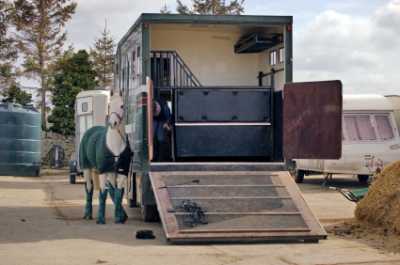|
By Jerry Tardif
First time trailer owners are often a little uncomfortable actually using their trailers.
They've read articles and heard stories about safety issues and understand that they're venturing into "unknown territory".
Typical statements and questions include:
- I just bought my first trailer, but am somewhat apprehensive about getting started.
- What will it feel like to tow a trailer?
- Will I experience any changes once I add my horse's weight to the trailer?
- What about adding a second horse?
These are all good questions because most people experience a little trepidation upon buying your first trailer and getting started using it.
In fact, they feel this trepidation indicates a mature concern for not moving too fast or too soon in a new area where your safety and your horses can be affected.
That said, we do want to keep moving forward.
If you've felt this way yourself and are somewhat concerned about going forward, read on.
Unstanding what to do in the right way goes far to reducing fear anxiety about doing something for the first time.

There's a First Time for Everyone
Proper Tow Vehicle
The first thing you want to do is to assure your tow vehicle can safely pull the weight of your trailer and the number of horses you can place in it.
Of course, weight is affected by the size of your horses as well as the number of horses you're towing, and I'm hoping you've properly dealt with all this and made sure you've got the right tow vehicle BEFORE you selected and bought your trailer.
If in doubt, consult your trailer dealer, though in all honesty, any good dealer worth his/her salt should have engaged you in this discussion as part of the shopping process before selling you a trailer.
Properly Connected
Once you've got the proper vehicle and trailer for your intended load, the next thing to do is to connect your trailer.
Make sure you do it all: connect the trailer properly, secure the hitch, raise the jack leg, attach the safety chains, attach the electrical cable, attach the breakaway brake, etc.
Test Turning & Brakes at Slow Speed
Now, drive your rig slowly down the road while experiencing how your tow vehicle responds differently with the trailer in tow.
Try gentle and somewhat sharper turns in both directions, but don't take any really sharp turns — that's not a good idea with a trailer — your turns should be wider than when driving without a trailer attached.
Next, try applying the brakes.
Do it gently, intermediately, and try even some harder braking — still while at a slow speed.
You'll quickly realize that you'll be safest when making gentle turns and gentle stops.
That's even more important for your horse.
You don't want to be stressing his legs and throwing him into the front or side wall by the inertia of your action.
The best way to reduce stresses on your horse and towing rig on any trip is not to ever go too fast.
Going faster requires much longer turns and stopping distances and you NEVER want to run out of space you need to turn or stop.
Speed Up & ReTest
As you get more comfortable, speed up and try turns and stops again, but avoid sharp turns and hard stops — these can become dangerous as your speed increases.
Once you're comfortable, then load your horse and drive slowly while gradually working up to the speeds you'll usually want to go.
Normally, that's not going to exceed 45 - 50 MPH — risk of injury or worse goes up quickly for you and your horse as you increase speed above that range.
You're going to notice that each increase in weight reduces the response of your tow vehicle and increases the time it takes to respond.
If you're uncomfortable with the handling of your rig, talk to your trailer dealer about whether or not you can use a weight distribution system with your vehicle and trailer.
If you can, it will significantly improve handling, even out bumps, reduce the effect of wind, and keep your entire rig more level.
Here are some articles that should help get you started:
- Getting Properly Hitched
- Common Trailering Questions
- Trailer Brake Controllers
- Tow Vehicles
- Tire Safety When Towing Horses
- Spring Trailer Inspection & Preparation
- Wind and Trailering
- How Often Should I Stop When Trailering?
- Learning to Back a Trailer
- Trailering Draft Horses
Have Fun!
Having a horse trailer opens up a whole new world of events and freedom as to where you can ride.
Besides being an avid trail rider, Jerry Tardif is a technology consultant and a horse and nature photographer in SE Connecticut — see his work at: www.jerrytardif.com.
He is also co-founder and President of QueryHorse.
Back to Article Index
|